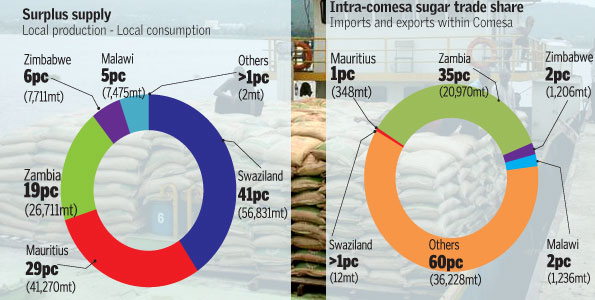News
Five Southern Africa countries to plug sugar deficit in Kenya

Five Southern African countries are the beneficiaries of duty-free sugar exports to Kenya approved under the new Common Market for Eastern and Southern Africa quota deal.
Allocation criteria based on domestic surpluses that the 19-member economic bloc adopted two weeks ago in Lusaka, Zambia, will see Malawi, Zambia, Mauritius, Swaziland and Zimbabwe export duty-free sugar to Kenya to plug the deficit there.
“The scramble for the Kenya sugar market will be between the countries with a surplus. Egypt has been edged out and Uganda will only ride on the East African Community open market while competing with other qualified countries,” said Nelson Ndirangu, director for economics and external trade in Kenya’s Ministry of Foreign Affairs and International Trade.
Egypt, which has been accused of flouting the rules of origin by importing sugar and repackaging it for export, has fallen further down the priority list because of deficits in the domestic markets.
Uganda, which was under the spotlight recently after President Yoweri Museveni and Kenya’s Uhuru Kenyatta struck a deal to allow Ugandan sugar to access Kenyan market, has been edged out because it is ranked as a deficit market.
The allocation criteria were agreed upon at the Comesa Council of Ministers meeting held in Zambia earlier this month during which Kenya was also allowed to delay opening its market for sugar for another year until February 2017.
The criteria gave countries with domestic surpluses leeway to export up to 70 per cent of the declared sugar deficit in Kenya, while the balance of 30 per cent will be allocated depending on a country’s share of intra-Comesa trade in the commodity.
Sources at Kenya’s Ministry of Foreign Affairs and International Trade said the five countries and Madagascar, which has a deficit had already expressed interests in servicing the unmet demand of 200,000 tonnes in Kenya beginning next year.
The quotas will be allocated using current years figures for each country.
A draft report by the trade and Customs experts indicates that under the surplus category, Swaziland leads with 570,195 tonnes, followed by Mauritius and Zambia at 414,074 tonnes and 268,000 respectively.
In the intra Comesa trade category, Zambia commands 34.95 per cent of the market share.
The other countries command a market share of below five per cent each.
Other EAC member states in the Comesa bloc include Rwanda and Burundi, all with a deficit and a below 5 per cent market share in the intra-trade category.

The quota system has brought to an end to nine months of first come first served trade that started in February 2015.
In the first 10 months of 2014, Egypt exported 10,700 metric tonnes of sugar and 11,600 tonnes in 2015. Zambia exported 5,100 tonnes in 2014 and 19,600 tonnes in 2015 while Madagascar and Mauritius exported 30,400 tonnes and 22,600 tonnes respectively in 2015.
Egypt produces two million tonnes of sugar against a consumption of three million tonnes, leaving a deficit of one million tonnes. Egypt is, however, the second largest trading member in the bloc with a 27.86 per cent market share.
Egypt had proposed an option whereby 40 per cent of the quota would be based on sugar production, 40 per cent on trade and 20 per cent on sugar surplus.
Although the proposal was defeated, Egypt’s suggestion that the criteria be reviewed after every two years was allowed.
Egypt protested that relying on surplus production denies member states with sufficient capacity an opportunity to export sugar that meets the Comesa rules of origin.
“Egypt felt frustrated because of its capacity to import raw sugar, produce, package and export but after two years we may see a review in Egypt’s favor,” said a source privy to the discussions.
Other members, however, insisted that the formula should not encourage importation of sugar from world markets but instead encourage domestic production. Kenya was warned that the safeguards will not be extended beyond 2017.
To boost sugar production, Kenya intends to privatise government-owned firms and pay farmers on the bases of sucrose content as opposed to volume of sugarcane.
As the summit was going on in Lusaka, the Kenya Privatisation Commission invited bidders to submit applications for stakes in Nzoia, Chemelil, South Nyanza, Muhoroni and Miwani Sugar companies.
Setback
However, the process suffered a setback last week when the High Court stopped the process after the Transition Authority challenged the legality of the auction.
The Privatisation Commission, however, said it was advised by the Attorney General’s Office that it was exempted from seeking the authority’s input in transferring the agricultural assets, which under the Constitution, now belong to respective counties and not the national government.
Despite the government’s efforts to bring faster maturing cane varieties, adoption has been slow because they require more labour between crops. Local leaders have also been vocal against the privatisation of the companies, which would wean farmers of endless government bailouts.




